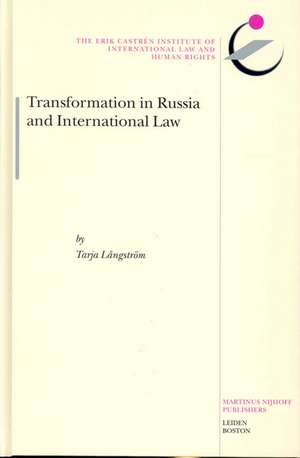Transformation in Russia and International Law: The Erik Castrén Institute Monographs on International Law and Human Rights, cartea 6
Autor Tarja Långströmen Limba Engleză Hardback – 17 noi 2003
Preț: 1203.73 lei
Preț vechi: 1467.96 lei
-18% Nou
Puncte Express: 1806
Preț estimativ în valută:
230.36€ • 239.13$ • 192.08£
230.36€ • 239.13$ • 192.08£
Carte indisponibilă temporar
Doresc să fiu notificat când acest titlu va fi disponibil:
Se trimite...
Preluare comenzi: 021 569.72.76
Specificații
ISBN-13: 9789004137547
ISBN-10: 9004137548
Pagini: 498
Dimensiuni: 169 x 244 x 38 mm
Greutate: 1.04 kg
Editura: Brill
Colecția Brill | Nijhoff
Seria The Erik Castrén Institute Monographs on International Law and Human Rights
ISBN-10: 9004137548
Pagini: 498
Dimensiuni: 169 x 244 x 38 mm
Greutate: 1.04 kg
Editura: Brill
Colecția Brill | Nijhoff
Seria The Erik Castrén Institute Monographs on International Law and Human Rights
Cuprins
Preface by the series editor, acknowledgements, abbreviations, introduction, 1. The Scholarship of International Law in Russia, 1.1 The Russian Empire and International Law, 1.2 The Soviet Union and International Law, 1.2.1 Revolution and International Law (1924-30), 1.2.2 Socialism in One Country and International Law (1931-38), 1.2.3 Stalinism and International Law (1938-55), 1.2.4 De-Stalinisation and International Law (1955-85), 1.2.5 Perestroika and International Law (1985-1991), 1.3 The Russian Federation and International Law, 1.3.1 Democratisation and Foreign Policy, 1.3.2 International Law as it is Taught in Russia, 1.3.3 Ideological Pluralism and International Law Scholarship, 1.4 Concluding Remarks: The Doctrinal Development of International Law, 1.4.1 A Point of Continuity: The Scholarship’s Function, 1.4.2 Return to the Idea of the Legal Consciousness of the People as the Ultimate Source of Law, 1.4.3 About the Concept of International Law, 2. Succession of States in the Former Soviet Union, 2.1 Law of State Succession Revisited, 2.2 Does Status Determine Continuity of Re1ations or Vice Versa? 2.2.1 About the Thesis of Continuity between the USSR and the Russian Federation, 2.2.2 About the Baltic States' Legal Restorationism 2.3 Treaties of the Former Soviet Union, 2.3.1 Arms Control and Disarmament Treaties: Flexible Solutions in the Interest of Security, 2.3.2 Human Rights and Humanitarian Law Treaties: A Special Category? 2.3.3 No Succession to the Membership in International Organisations, 2.3.4 Bilateral Treaties: Pragmatic Solutions Treaty by Treaty, 2.4 Re-Allocation of the Assets and Liabilities of the Former Soviet Union 2.4.1 State Property Located within the Territory of the Former Soviet Union, 2.4.2 Soviet Debt and Property Located outside the USSR -Continuity through Succession, 2.5 State Succession in the Former Soviet Union and Borders, 2.5.1 Former Administrative Borders between the Soviet Republics Internationalised, 2.5.2 Continuity of External Frontiers of the Soviet Union, 2.6 Regulation of Nationality of the Former USSR Citizens in Russia, 2.7 Concluding Remarks about State Succession in the Former Soviet Union,
2.7.1 About the 'State-Continuator' Concept, 2. 7.2 The Malleability of the Law of State Succession and the Relevance of Other Doctrines, 3. The Relation of International and Domestic Law, 3.1 From Soviet to Russian Treaty-Making: Procedures Fixed in a Special Law, 3.1.1 The Conclusion of Treaties, 3.1.2 The Component Units of the State and Treaties, 3.1.3 Initiating the Treaty-Making Process, 3.1.4 The Control of Constitutionality of Treaties, 3.1.5 The Provisional Application of Treaties, 3.1.6 The Publication of Treaties, 3.1.7 The Termination of Treaties, 3.2 The Domestic Implementation of International Law, 3.2.1 The Relation of International and Domestic Law in the Soviet Union, 3.2.2 Human Rights Revisited: Perestroika and Constitutional Supervision, 3.2.3 The 1993 Constitution of the Russian Federation: A Monist Basic Solution, 3.3 International Law in Courts, 3.4 Concluding Remarks about the Relation of International and Domestic Law,
3.4.1 Treaty-Making: Democratic Procedures against an 'Imperial Tradition', 3.4.2 Implementing the Monist Idea, 4. Conclusions: The 'Democratisation' of Russia and International Law, Bibliography and Table of Cases, Index.
2.7.1 About the 'State-Continuator' Concept, 2. 7.2 The Malleability of the Law of State Succession and the Relevance of Other Doctrines, 3. The Relation of International and Domestic Law, 3.1 From Soviet to Russian Treaty-Making: Procedures Fixed in a Special Law, 3.1.1 The Conclusion of Treaties, 3.1.2 The Component Units of the State and Treaties, 3.1.3 Initiating the Treaty-Making Process, 3.1.4 The Control of Constitutionality of Treaties, 3.1.5 The Provisional Application of Treaties, 3.1.6 The Publication of Treaties, 3.1.7 The Termination of Treaties, 3.2 The Domestic Implementation of International Law, 3.2.1 The Relation of International and Domestic Law in the Soviet Union, 3.2.2 Human Rights Revisited: Perestroika and Constitutional Supervision, 3.2.3 The 1993 Constitution of the Russian Federation: A Monist Basic Solution, 3.3 International Law in Courts, 3.4 Concluding Remarks about the Relation of International and Domestic Law,
3.4.1 Treaty-Making: Democratic Procedures against an 'Imperial Tradition', 3.4.2 Implementing the Monist Idea, 4. Conclusions: The 'Democratisation' of Russia and International Law, Bibliography and Table of Cases, Index.












